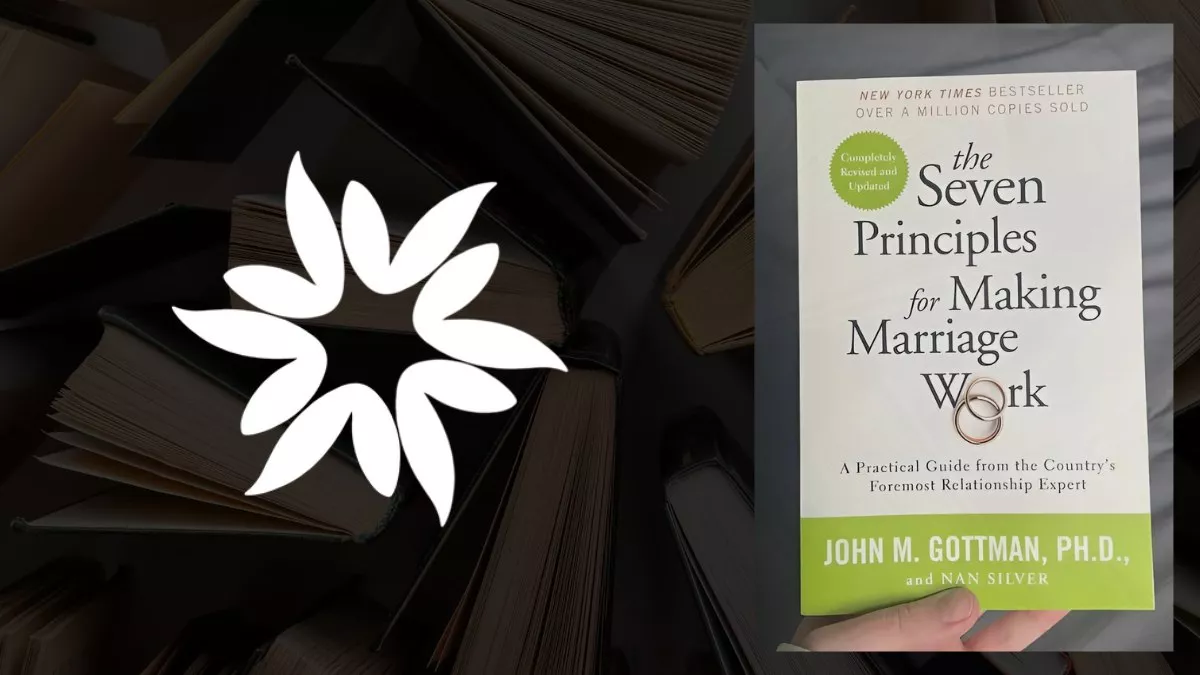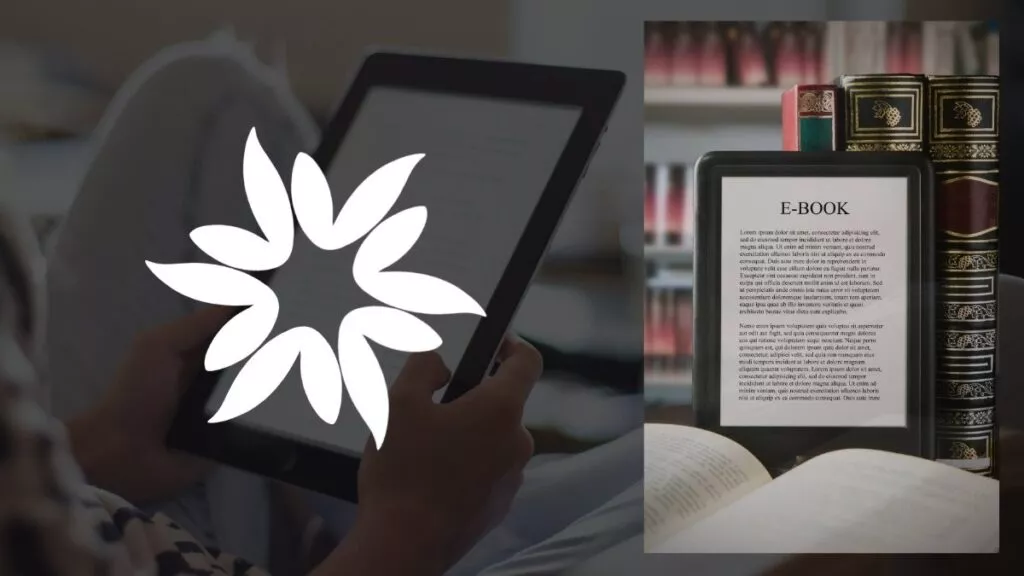You’re probably at that stage where you’re looking back on your marriage’s honeymoon phase—when everything felt perfect, and you thought, “We can handle anything together, and this love will last forever!”
But now, maybe you’ve hit a few bumps, and suddenly, you’re telling friends, “Yeah, maybe don’t rush into marriage.”
But as anyone who’s been married a while can tell you, relationships require more than love to keep that glow going.
That’s why we’ve compiled a list of the 15 most popular marriage counseling books proven to help.
You’ll be pleased to know these books are packed with practical tips, real-life stories, and expert advice to help you and your partner strengthen your bond, tackle challenges, and bring back that connection you both miss.
1. The Seven Principles for Making Marriage Work by John Gottman
John Gottman’s The Seven Principles for Making Marriage Work is like a cheat sheet for a happy marriage, backed by over 40 years of solid research.
Interestingly, Gottman spent decades watching couples interact in his “Love Lab” and developed seven golden rules that can totally transform your relationship if you follow them.
The book doesn’t only preach concepts like “no fighting”; it’s more about learning to manage conflict without blowing things up.
Gottman identifies four big relationship killers (which he dramatically calls the “Four Horsemen”): criticism, contempt, defensiveness, and stonewalling. So, if any of these are showing up too often in your marriage, it’s time to pay attention.
But the heart of the book is the seven principles that can keep things healthy. For example, “Share Love Maps” is about knowing the little details about your partner’s life—basically, keeping your mental map of your partner updated.
“Turn Towards Each Other Instead of Away” is another simple but powerful tip. Essentially, it’s about connecting over the small stuff, like responding when they ask for your attention instead of ignoring or brushing them off.
And there’s advice on how to solve the solvable problems (yes, some things can be fixed) and deal with the deeper, trickier issues.
At its core, this book is a toolkit for building a marriage based on friendship, respect, and emotional smarts.
Gottman’s exercises and real-life tips make the advice easy to follow, making it a perfect read for couples who want to strengthen their bond rather than just survive conflicts.
2. The 5 Love Languages by Gary Chapman
Gary Chapman’s The 5 Love Languages is basically a relationship decoder. The idea is that everyone “speaks” a primary love language, and problems pop up when you don’t speak your partner’s.
The five languages Chapman talks about are words of affirmation, acts of service, receiving gifts, quality time, and physical touch.
It’s safe to say the genius of this book is in its simplicity. Let’s say you show love by doing things for your partner (acts of service), but they really want to hear words of appreciation (words of affirmation).
For example, you might be cleaning the house and running errands, but they could still feel unloved because they crave verbal validation.
According to Chapman, the key is to determine your partner’s love language and learn to “speak” it.
What makes The 5 Love Languages so popular is how relatable they are. Chapman breaks it all down in a way that’s super easy to understand and apply.
You don’t need a psychology degree to get it—it’s practically common sense, but it’s laid out in a way that helps couples avoid those classic “I thought you knew I loved you” moments.
Whether you’re new to relationships or just looking to get better at showing love, this book is a game-changer for emotional intimacy and communication.
3. Hold Me Tight by Dr. Sue Johnson
Hold Me Tight by Dr. Sue Johnson is a game-changer for relationships. It uses Emotional-Focused Therapy (EFT) to help couples create deeper emotional connections.
Instead of focusing on solving problems or big romantic gestures, Dr. Johnson says that what really makes a relationship strong is emotional responsiveness—basically, how well you tune into each other’s emotional needs.
The book guides couples through seven important conversations that help them break out of negative communication habits, heal old wounds, and reconnect on a deeper level.
These seven conversations include:
- Recognizing the Demon Dialogues – Spot those toxic communication patterns that keep popping up.
- Finding the Raw Spots – Get to the root of each other’s emotional sore spots.
- Revisiting a Rocky Moment – Repair times of disconnect.
- Forgiving Injuries – Rebuild trust by talking through past hurts.
- Bonding through Sex and Touch – Explore the emotional importance of physical intimacy.
- Keeping Your Love Alive – Keep the bond fresh with new emotional experiences.
Dr. Johnson’s approach works because it taps into attachment theory, which says that adult love is as fundamental as the bond between a child and their caregiver.
With real-life stories and hands-on exercises, Hold Me Tight helps couples go from feeling disconnected to building a secure, loving relationship.
It’s especially great for anyone feeling distant in their relationship or looking to strengthen their emotional bond.
4. Attached by Amir Levine and Rachel Heller
Attached by Amir Levine and Rachel Heller explores how one’s childhood attachment style—secure, anxious, or avoidant—affects adult relationships.
Using attachment theory, the book explains how we connect (or sometimes disconnect) with our partners based on how we were cared for as kids.
Through quizzes and self-assessments, you’ll learn to identify your own attachment style and your partner’s, too.
Once you know your style, you can figure out what you and your partner need to feel emotionally safe and close.
For instance, if you’re the anxious type, you might need more reassurance and closeness, while an avoidant partner might need a little more space.
If you find yourself repeating the same relationship mistakes or having difficulty meeting each other’s emotional needs, Attached is a helpful guide to breaking out those patterns.
It’s all about building healthier, more secure attachments that lead to happier, long-lasting relationships.
P.S. If you’re looking for a novel that could inspire the love you felt from these books, check out our list of the greatest novels of all time.
5. Mindful Relationship Habits by S.J. Scott and Barrie Davenport
In Mindful Relationship Habits, S.J. Scott and Barrie Davenport outline 25 super practical habits to help couples grow closer and keep the spark alive using mindfulness.
The big focus here is being present—tuning in to your partner at the moment instead of letting everyday distractions or old grudges get in the way.
With that in mind, the book encourages emotional awareness and better communication so couples can understand and connect more deeply.
Some key habits include practicing gratitude (like saying thank you for the little things), being a good listener, and making regular time for meaningful moments together.
In turn, these habits are designed to help couples stop reacting on autopilot, improve how they communicate, and build real emotional intimacy.
On top of that, the book tackles common relationship hurdles like juggling personal goals with relationship goals, handling conflict in a calm, mindful way, and keeping the emotional connection strong as time goes on.
Whether you’re trying to reignite a spark that’s been fading or just looking to keep your relationship thriving, Mindful Relationship Habits gives you many straightforward, research-backed tips to help couples stay emotionally connected for the long haul.
6. No More Fighting by Alicia Muñoz
Alicia Muñoz’s book No More Fighting is perfect for couples who want a clear plan to improve their relationship. And the best part is it only takes 20 minutes a week.
The book focuses on dealing with common conflicts, improving communication, and getting closer emotionally.
Built around weekly sessions, you and your partner dive into guided conversations to bring you closer.
Each tackles a specific issue—like trust, money, or intimacy—and comes with prompts, questions, and exercises to help unpack emotions, identify triggers, and find healthier ways to handle conflict.
Best of all, it’s designed to be bite-sized, so you only need to dedicate 20 minutes each week.
Another great thing about this book is its focus on creating emotional safety. Muñoz encourages couples to build an environment where both partners feel safe to be vulnerable and share their needs.
And this kind of trust makes it easier to work through conflicts in a kind and empathetic way.
Similarly, there’s also a section on healing emotional wounds after a fight has caused hurt feelings.
It undoubtedly helps couples navigate those tough moments with empathy and understanding, making it easier to rebuild trust and strengthen their bond.
Overall, No More Fighting gives couples practical tools to manage conflict, communicate better, and grow closer with consistent, structured chats.
7. The Mastery of Love by Don Miguel Ruiz
The Mastery of Love by Don Miguel Ruiz is like a heart-to-heart guide on how to heal those emotional scars we carry around and start truly loving ourselves.
Ruiz pulls from ancient Toltec wisdom and says that a lot of our relationship pain comes from fear, self-doubt, and the pressure we feel from society.
We always try to find love and happiness from others, but the real magic happens when we start loving ourselves first.
One of the big ideas in the book is that we’ve been taught to feel like we don’t deserve love, thanks to past experiences and what the world tells us.
Undeniably, this self-doubt causes us to act out of fear in relationships, like being controlling, jealous, or constantly needing reassurance.
Ruiz says real love isn’t about controlling or fearing; it’s about freedom, trust, and accepting each other just as we are.
It’s incredible that the book’s core focus is on stopping the exhausting search for love outside ourselves and learning to nurture self-love.
When we’re full of love on the inside, we won’t go looking for it with strings attached.
He uses simple yet powerful examples, like the idea of a “magical kitchen” filled with endless love, to show how if you’re already full, you’re not hungry for anyone else’s approval.
Ruiz also talks about how fear works like a “parasite” that messes with your mind and leads to unhealthy behavior.
For instance, the way to beat this fear is to be aware of it, forgive yourself, and move forward with a clear head. This leads to happiness and better, more meaningful relationships.
In short, The Mastery of Love is packed with deep lessons about healing and finding your true self. It helps you release emotional baggage and build more loving, healthier connections with others.
8. Eight Dates by John and Julie Gottman
Eight Dates: Essential Conversations for a Lifetime of Love by John and Julie Gottman is like a relationship roadmap for couples.
Communication is key in any healthy relationship, so this book is centered, importantly, around having deep, meaningful talks that keep your relationship strong and thriving.
Based on years of research, this book gives couples a guide to honest conversations about the things that matter in a relationship, like trust, money, sex, family, and future dreams.
The Gottmans believe that a healthy relationship is built on constant, open communication. Each “date” in the book tackles a big topic that can make or break a relationship.
For instance, the first date dives into “Trust and Commitment” and gets couples talking about what it means to rely on and be open with each other fully.
Another date is all about “Sex and Intimacy,” where couples are encouraged to share their needs and grow closer emotionally.
These conversations are set up to keep things on track and prevent problems from simmering under the surface. By talking openly about things like money or family, couples can avoid bigger issues down the road.
The book also suggests making regular date nights a habit, using them as a way to build emotional closeness through real, honest talks.
Overall, Eight Dates is a practical, research-based guide that gives couples the tools they need to keep their bond strong at any stage.
9. Deal Breakers by Dr. Bethany Marshall
Deal Breakers is like a relationship survival guide, especially for women, showing how to spot and deal with toxic behavior in a partner.
Dr. Bethany Marshall explains that, like a business deal, relationships have non-negotiables—or deal breakers.
If your partner crosses those lines, it’s a clear sign that the relationship might not be worth sticking around for.
She highlights some big red flags, like cheating, addiction, control issues, abuse, and emotional coldness.
Of course, these behaviors slowly undermine trust and happiness over time. Marshall’s advice is simple: if both people cannot fix these deep problems, it’s probably best to walk away.
Sticking around in what she calls “relationship purgatory”—where you’re unhappy now but hoping things will magically get better—can do more damage in the long run.
A big part of the book dives into emotional manipulation, where one partner might make you feel needy or like you’re overreacting just for expressing your feelings.
She uses real-world examples to show healthy boundaries and when it’s time to cut ties.
The whole point is to empower you to protect your emotional well-being, stand firm on your boundaries, and demand respect.
10. Couple Skills by Matthew McKay
Couple Skills gives couples the tools to talk and work through conflicts, such as pros.
Matthew McKay, Patrick Fanning, and Kim Paleg offer practical advice backed by psychology to help partners build trust, handle arguments, and connect on a deeper emotional level.
To guide couples along the way, the book walks couples through important skills like really listening to each other, being empathetic, and speaking up without being confrontational.
McKay stresses that knowing your emotional triggers and sharing your feelings calmly can prevent small fights from turning into bigger issues.
The book’s exercises encourage partners to practice these skills together as part of the process, leading to better understanding and support.
One key takeaway is that every relationship will have conflicts—what matters is how you handle them.
Plus, McKay offers step-by-step tips for cooling down arguments and solving problems in a way that strengthens rather than weakens the relationship.
By working on these skills, couples can build a solid base of respect and emotional security, which is essential for a long-lasting, happy partnership.
11. Too Good to Leave, Too Bad to Stay by Mira Kirshenbaum
Next up, this book is like a lifeline for anyone feeling stuck in a good and bad relationship. You know, when you’re caught between “I should leave” and “I can’t let go.”
Kirshenbaum, a therapist, walks you through these confusing feelings and offers a step-by-step process to help you figure it out.
The magic here is in the 36 questions she gives you to ask yourself. And these questions dive into the real stuff that matters in a relationship—things like emotional connection, respect, trust, and physical closeness.
She also gets you thinking about whether there’s real love left or if you both still like and respect each other beyond the usual fights and frustrations.
Answering these questions can help you better determine whether your relationship is worth saving or is doing more harm than good.
Kirshenbaum doesn’t sugarcoat things, either. She’s upfront that if there’s no affection or constant fighting, it might be a sign that it’s time to move on.
But there might be hope if love is still in the mix and both people are willing to try. In short, this book gives you a caring yet straightforward way to decide one of the hardest things—whether to stay or go.
12. Men Are from Mars, Women Are from Venus by John Gray
This book was a massive deal in the ’90s and still has people talking. John Gray breaks down how men and women often communicate as if they were from different planets, with completely different needs and ways of dealing with emotions.
Gray’s main idea is that men and women approach things in opposite ways. For example, men tend to retreat into their “cave” when they’re stressed, while women want to talk things out.
As you probably know already, this can lead to all kinds of misunderstandings: women feel ignored when men pull back, and men feel smothered when women want to talk through everything.
However, Gray believes that if couples recognize these patterns, they can better understand each other and avoid unnecessary fights.
The book isn’t just theory either; it’s full of practical tips. For instance, Gray suggests that men should offer understanding and empathy when women share feelings instead of rushing to “fix” things.
He also tells women to give men space when they pull away, trusting they’ll return once they’ve sorted out whatever’s on their minds.
While some people love the book’s insights, others think it relies too heavily on old-school stereotypes about gender.
But whether you agree with everything or not, many people have found it helpful to understand their partner a bit better.
13. The Relationship Cure by John Gottman
In The Relationship Cure, John Gottman lays out a five-step plan to help you build stronger emotional connections in all kinds of relationships—whether it’s with your partner, family, or even coworkers.
The book’s heart is the idea of “emotional bids,” which are basically little ways people ask for attention, affection, or connection.
How you respond to these bids—whether you lean in and engage, ignore them, or react negatively—makes or breaks the relationship.
Gottman walks you through how to spot and improve these emotional bids in everyday interactions. He includes real-life examples and exercises to help you out. Put simply, it’s about the small actions that can make a big difference.
Not to mention, the book focuses on how good listening skills and being more aware of your emotional communication can help you connect better with others.
All in all, it’s packed with practical advice for strengthening relationships and dealing with conflicts, whether at home or work.
14. His Needs, Her Needs by Willard F. Harley Jr.
In His Needs, Her Needs, Willard F. Harley Jr. breaks down how to understand and meet your partner’s emotional needs to keep your marriage strong.
His main idea is that marriages can avoid affairs if both partners learn what each other needs and make an effort to meet those needs.
He lists ten emotional needs, five that are typically important to men and five that women often prioritize: affection, sex, conversation, and financial support.
One of the book’s main points is balance: ignoring one person’s needs can make them feel disconnected or tempted to stray.
Harley’s approach prevents that by ensuring both people feel valued and understood.
Amazingly, the book has many practical tips, including quizzes and exercises, so couples can determine each other’s top needs and how to fulfill them.
15. Getting the Love You Want by Harville Hendrix and Helen LaKelly Hunt
Getting the Love You Want by Harville Hendrix and Helen LaKelly Hunt is about how our past, especially our childhood, affects our behavior in relationships.
The book introduces Imago Relationship Therapy, which suggests we’re often drawn to partners who remind us (sometimes unconsciously) of unresolved issues from our past.
It explains that many relationship problems stem from unmet emotional needs and that couples can heal and grow together by recognizing these.
Arguably, the best part of this book, and many other books on our list, is the practical tools, like structured dialogues and exercises, that help couples build empathy and understanding.
One of the standout techniques is the “Imago Dialogue,” which helps couples hear each other and healthily talk through their issues.
The goal is for couples to create a deeper and more loving connection by recognizing and addressing their patterns.
Found the Right Book? Share It with Your Partner!
So, did you find a book that sounds perfect for you and your partner? If you did, why not share it with them or even read it together?
The real magic happens when both of you are on the same page—literally and figuratively. If one book doesn’t quite hit the mark, don’t stress. Just grab another!
Every relationship is different, and what works for one couple might not work for another.
Don’t just read these books and call it a day. You’ve got to apply what you learn!
Try out the tips, have the conversations, and put those ideas into practice with your partner. That’s where the real transformation happens.
These books are full of great advice, but the effort you both put in will keep your relationship strong and happy in the long run.
Oh, and if you enjoyed this read, we think you’d love our article on the best life-changing spiritual books!








